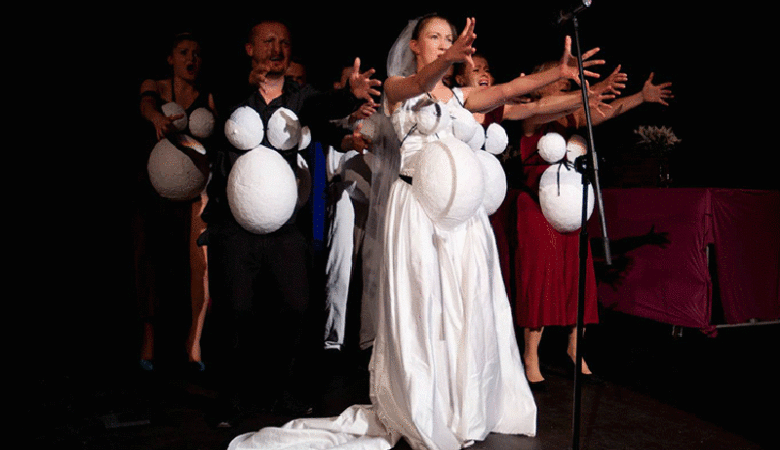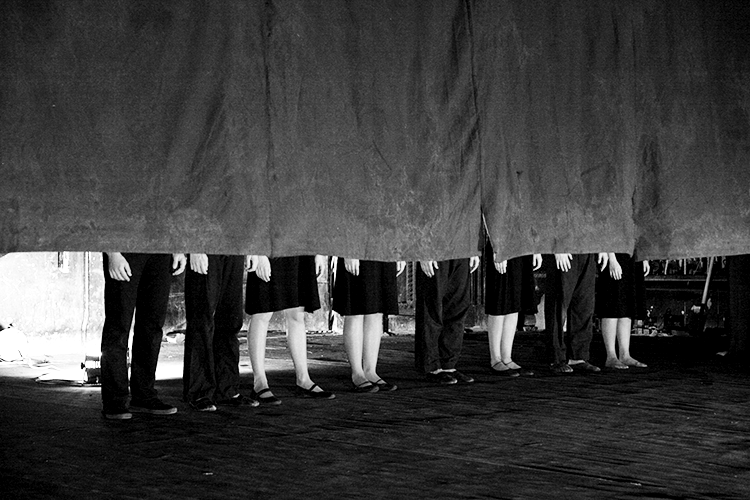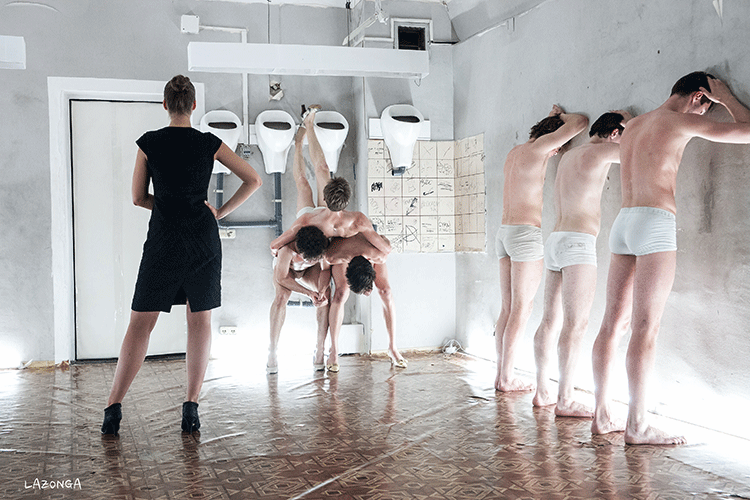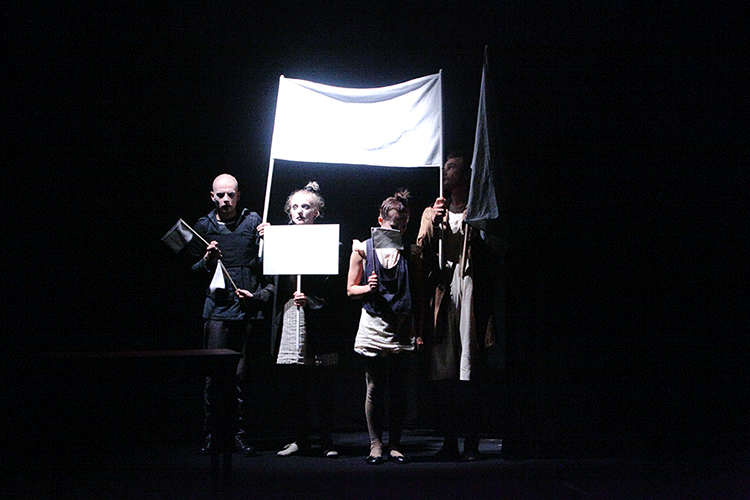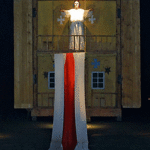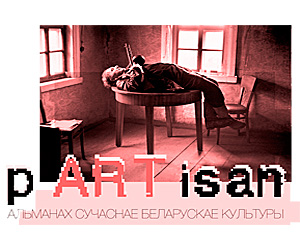KorniagTHEATRE
Brendan McCall © 2014
Many foreign audiences assume all Belarusian artists make political work, often inserting political discourses into pieces that aim to explore other subjects with different metaphors. Below is an interview with members of an independent Belarusian theater company that you probably haven´t heard of yet, that hopes to create performances that have nothing to do with politics. If Korniag Theatre is not interested in discussing Lukashenko or “the last dictatorship in Europe”, like we expect, then what is their work about?
ON REVOLUTIONARIES AND ROCK STARS
I first learned about the reality of Belarus through men and women dramatizing it. A few years ago, I read David L. Stern´s article for theNew York Times about the Belarus Free Theatre in Minsk, an independent theater company founded in 2005 by Nicolai Khalezin and Natalya Koliada. While located in the newspaper´s Arts section, the essay was much more than a review of the performance “Numbers”, an excerpt from the group´s larger work Zone of Silence. Substantial ink was devoted to the living and working conditions for these Belarusian actors, directors, and writers, “the only unregistered—and therefore independent—dramatic collective in this country of 10 million on the edge of Europe”; and in Belarus, “unregistered” means “illegal” (1).
There were descriptions of selected scenes from “Numbers,” giving an example of the group´s powerful blending of dance, music, and theatrical languages. The column also shared some of the secret and unconventional non-theatrical spaces this underground group has been forced to perform in to avoid the KGB arresting them and their audiences, which had become a common occurrence. The article also talked about the personal costs to Belarus Free Theatre members—the losing of their jobs, and sometimes the same for their immediate family members—in order to continue making “relevant theater”, in the words of Khalezin, which “deals with issues that people are used to keeping silent about” (2).
Beyond their local notoriety, and in contrast to the constant pressure from the tools of President Alexander Lukashenko´s authoritarian regime, Belarus Free Theatre simultaneously garnered extraordinary support and admiration internationally by institutions and various theatre professionals, including Jude Law, Ian McKellan, Tom Stoppard, and the late Harold Pinter. For the world media, the personal experiences of Khalezin and Koliada become immediately associated with the political situation of the entire country, and thus inseparably linked to their theatrical art. Coupled with their affiliations with celebrities like Mick Jagger and Sting, our perception of Belarus Free Theatre´s work has been filtered through the international media´s dual portrayal of them as theater revolutionaries and rock stars.
After the protests in December 2010 in response the “re-election” of Lukashenko, which resulted in the infliction of violence and incarceration of thousands of demonstrators from Minsk´s Independence Square, including Koliada and Khalezin, Belarus Free Theatre has lived in exile. Since being granted political asylum from the United Kingdom in 2011, the group continues to make original political work face to face with an international mix of performers within the democratic safety of London, as well as continues to discretely direct pieces with their Belarusian colleagues still in Minsk via Skype.
Theirs is a powerful and inspiring tale of resistance, survival, and resourcefulness; of how art can, as Vaclav Havel described it in his 1978 essay, give “power to the powerless”. Yet it also influences how we see any art that originates from Belarus, suggesting that all Belarusian art is — or should be — political. Of course, like any country, the cultural identity and artistic activity of Belarus is complex. I have written elsewhere about Belarusian visual artists, both in and outside of the country, whose work explores other subject matter beyond politics in an attempt to grasp a more complete picture of Belarus´ diverse contemporary scene (3).
But what about theatre and the performing arts — are there other independent groups besides Belarus Free Theatre working today that we can examine? Is their work similar or different?
“THEY STILL DO NOT HAVE INTERNET?”
“We do what we like. We do things which are interesting and relevant from our point of view. State Theatres in Belarus have Plans which all of them must fulfill, Plans from the Government; and, in my opinion, their work has nothing to do with the art….Sometimes I think that maybe they still do not have internet?”
KorniagTheatre is an independent group from Belarus that serves as the artistic vehicle for director Evgene Korniag, born in Minsk and a graduate of the Belarusian Academy of Arts. His final thesis project for that school, “Not a Dance” (2007), introduced the aesthetic which has become associated with KorniagTheatre ever since: a physical or plastic theatre where “great importance is given to the actor´s body. Body is the main means of expression. This is the language the director uses to speak to the audience. If we speak about our theater´s mission, it is to speak with a language audiences in every country will understand”.
Producer Marina Dashuk adds that, in Belarus, “KorniagTheatre took a vacant niche of experimentation with the human body”, where the plasticity of the actor became “the main facilitator and mediator between the action onstage and the physical presence of the viewers”. She emphasizes that, though their work is highly physical, that it is still theatre, not dance. “Dance itself without dramatization is almost not interesting for us”, she says. “We always work with dramatic actors only. It is important to do our work that actors play the meanings of their body”.
After graduating from the Belarusian Academy, Korniag received further education in stage directing from the Meyerhold Center in Moscow, providing him the opportunity to “view a large number of theatre festivals, and plays in theatres. That had the strongest influence. Definitely”. Upon returning to Minsk, Korniag was originally determined to work solely within the borders of Belarus with Belarusian actors, as an expression of his love for his culture, language, and heritage. He found actors, designers, and other artistic collaborators who also shared his passion “to change something in the sphere of Belarusian theatre where experiment, the search for new forms, and relevance” were not being offered.
The new group soon discovered, however, that financial resources were scarce to produce the kind of unconventional theatrical work they envisioned as an independent entity in Belarus. Private and experimental venues do not exist in the country; and all of the stages are state-run, as well as subject to strict censorship and regulation of content. The funds necessary to rent a stage, pay for production materials, taxes, and other fundamental costs, were so limited as to be essentially non-existent.
Furthermore, this constant lack of money meant that their ability to create a permanent acting troupe proved impossible, they said, as all money earned from ticket sales went to paying for basic yet essential production costs.
“All of these difficulties”, says the group´s Manager, Alexandra Grigorovich, “distract us from being able to be creative. It feels like you´re moving nowhere”. Dushuk adds that their actors joke that they work for free in KorniagTheatre, and that “we took their passports. The first part of the sentence is not a joke”, she says. “Each participant of KorniagTheatre must have an official permanent job, because this is a participant’s journey through self-expression, creativity and experiment. We do not earn money — everybody invests their personal time and earnings to create this theatre”.
These harsh economic realities drove KorniagTheatre to alter its original Belarus-centric mission and seek more opportunities abroad. Currently, the group´s leadership is divided between Poland and Belarus: Marina and Alexandra primarily live and work in Bialystok, Evegene travels between here and Minsk to work, while their actors continue to primarily come the Belarusian capital across the border, more than four hour´s drive by car.
Yet the company finds the notion of finding a way stay in Poland for some time in the future appealing, as they feel there are more opportunities for the kind of work they seek to create. In contrast to neighboring Belarus´ predominant naturalistic theatrical style, in Poland there is a greater tradition of physical theater, they report, making their Polish audiences much more receptive to the kind of plastic performance style KorniagTheatre is interested in exploring.
POLITICIZING PLASTICITY
Throughout their career Belarus Free Theatre has infused their performances with highly political material, whether generating plays based on real events through documentary theatre techniques (like “Discover Love” or the three-part “Zone of Silence”), or shaping pre-existing texts into cohesive political performances (such as Vladimir Shcherban´s adaptation “Being Harold Pinter” taken from plays, speeches, and essays written by the late Nobel Laureate). By contrast, KorniagTheatre´s company members emphasize that their plastic stage art is not about politics. Korniag confesses to feeling no pressure at all to create political work as a Belarusian theatre artist.
“It seems”, he says, “that in the Belarusian theatres no one is waiting for something and no one has a hope”.
Dashuk and Grigorovich feel that Belarusian audiences and critics expect their work to be political, no matter what. This expectation continues when showing their work abroad, contextualizing their work solely as dissident political theater, and replacing the onstage metaphors with references to real-life politics from the Belarusian space.
Sometimes this can be frustrating or even bizarre. When performing their absurdist parable about fear “Play Number 7” at an international festival in 2011, the presenters marketed the work as being by “Korniag Theatre—denied the ability to perform in their home country of Belarus”. This was done without the company´s permission, and in fact, the piece itself has never been banned in Belarus. In 2013´s “Latent Men”, a piece about sexuality and human relationships, international audiences often remarked on how powerfully the images of the piece evoked the 1986 disaster at Chernobyl—an interpretation completely unintended or articulated by the artists.
In both instances, perhaps unconsciously, it is as if Western eyes were fetishizing Belarusian culture.
Blind to what is actually happening onstage with their unique plastic performance style, too often international audiences politicize KorniagTheatre´s work as is commonly done with all independent art emerging from Belarus today. It is narrowly assumed that all Belarusian art, including theater, revolves around politics, Lukashenko, and “the last dictatorship in Europe”. By subscribing to such a belief, we are continually missing the nuances of the complete picture of what is happening in the contemporary Belarusian art scene today, instead only seeing what we think we ought to see.
“…NOT WHAT IS NEEDED IN BELARUS RIGHT NOW”
“The process of creating the play is a mystery to me I still have not unravelled”, Korniag says. “Every time I do a new performance — I do not know how to do it. Every time I try to remember what I did for the last play, but it doesn’t work”.
Today, Grigorovich and Dashuk continue to apply for a number of public and private grants to see if KorniagTheatre can secure a more permanent stage in Poland. This past August the group premiered their latest work “From the Other Side” in Lodz, Korniag´s first collaboration with Chorea Theatre (Poland) and a work that marks a new direction in his growing and complex body of artistic work: towards subject matter which is, in this instance anyway, more political.
“The one thing I can say is that itis not a performance,” he asserts, referring to “From the Other Side” “The real performance is about the eternal things — Chekhov, Shakespeare. And this is not art, it´s pure epatage”.
As Evgene describes it, the piece “was created during the conflict between Ukraine and Russia….and of course, these events affected the performance”. The main action centers on a wedding, and the work incorporates live singing of traditional wedding songs originating from Belarus, Poland, and Ukraine. “My goal was to put characters in a situation where they must decide on which side to go, whom to choose: father or mother, son or daughter”, he explains.
“To put characters in a situation with an incredibly difficult choice that is not under the power of a normal person”.
Initial reception from the audiences in Lodz has been very strong, and Dushuk hopes KorniagTheatre may tour “From the Other Side” through Poland and Belarus in the coming year. In addition, the Belarusian director has been hired to direct a play in Minsk at one of the Belarusian state theaters sometime this fall. “At the moment, I still know nothing about this performance”, he says. “I only know that it will be a fairy tale for adults, that there will be a lot of songs, and it will be complete trash”. He admits that he has not really thought about it yet, but that he suspects that “working in a state theatre will be interesting because it will be a new experience for me”.
With KorniagTheatre juggling all of this activity—individual directing opportunities, collaborative work in Poland, touring, grant applications—what does the group´s founder feel is the greatest obstacle to doing his artistic work today?
“I have a specific opinion on the matter,” he says. “I believe that now contemporary modern theatre is absolutely not interesting, and is not what is needed in Belarus now.”
by Brendan McCall © 2014
Brendan McCall is an American theatre artist and writer based in Oslo. He is the Artistic Director of Ensemble Free Theater Norway and a Producer for Grusomhetens Teater.
(1) Stern, David L. “In Belarus, Theater as Activism,” New York Times, 22 September 2009.
(2) Ibid.
(3) McCall, Brendan. “Art, Truth, and Lies in Contemporary Belarus,” Regard Sur l´Est, 18 June 2014.
*This article was originally published in a slightly abbreviated form on 1 November 2014 (in French and English) in Regard Sur l´Est.
On the cover: From the Other Side written & directed by Evgenij Korniag, photo courtesy of Korniag Theatre
Opinions of authors do not always reflect the views of the editors. If you note any errors, please contact us right away.

